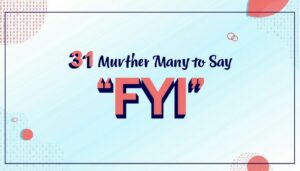When we reach out to someone, whether in a professional or personal context, starting the conversation with a positive and considerate greeting can set the right tone.
“Hope all is well” is a go-to phrase for many of us, but sometimes it can feel a bit overused or too generic. That’s where alternatives come in! In this article, we’ll explore 18 other ways to say “Hope all is well,” each offering a fresh approach to engaging with others.
Whether you’re sending an email to a colleague, a message to a friend, or a note to a client, these variations will help you sound thoughtful, approachable, and sincere.
“I Trust You’re Doing Well”
Meaning and Context: This phrase is often used in professional and formal settings. It expresses confidence in the person’s wellbeing and suggests that you trust everything is fine with them.
Example:
- “I trust you’re doing well and staying safe during these times.”
Impact: It’s a slightly elevated version of “hope all is well,” signaling both warmth and professionalism. This is especially useful in emails to colleagues, supervisors, or clients where you want to maintain a formal yet friendly tone.
“I Hope This Message Finds You Well”
Meaning and Context: A common and courteous phrase in both business and personal emails, it implies a hope that the recipient is in good health and spirits when they read your message.
Example:
- “I hope this message finds you well and enjoying the start of the new year.”
Impact: This phrase strikes a balance between formality and kindness, making it appropriate for initial correspondence, follow-ups, or even after some time has passed since your last contact.
“I Hope You’re Having a Great Day”
Meaning and Context: A casual, upbeat alternative. It expresses optimism and can work well in informal settings, such as when talking to friends or close colleagues.
Example:
- “I hope you’re having a great day! Looking forward to hearing your thoughts on the proposal.”
Impact: This version conveys positivity and friendliness. It’s perfect for quick messages or follow-ups, adding a little personal touch that makes the conversation feel more genuine.
“I Trust All Is Well on Your End”
Meaning and Context: Similar to “I trust you’re doing well,” but more specific to the recipient’s situation, this phrase conveys that you’re thinking about how they’re doing personally or professionally.
Example:
- “I trust all is well on your end and that you’re staying productive this week.”
Impact: It shows that you acknowledge the other person’s circumstances, while still being professional. Ideal for checking in with colleagues or clients.
“I Hope You’re Doing Great”
Meaning and Context: This phrase is friendly and casual, ideal for more personal exchanges.
Example:
- “I hope you’re doing great and that everything’s going well with your family.”
Impact: It creates a welcoming and relaxed vibe, making it perfect for friends, family, or acquaintances you’re not in frequent contact with.
“Wishing You All the Best”
Meaning and Context: A warm and heartfelt phrase often used when expressing good wishes, especially during times of change or uncertainty.
Example:
- “Wishing you all the best as you embark on your new role at the company!”
Impact: This phrase is positive and thoughtful, perfect for conveying genuine support and encouragement. It can be used both professionally and personally.
“I Hope You’re Feeling Good”
Meaning and Context: This alternative leans more toward the personal, expressing concern for the other person’s health or emotional state.
Example:
- “I hope you’re feeling good after your recent surgery and that your recovery is going smoothly.”
Impact: It’s empathetic and considerate, making it ideal for personal messages or situations where someone might be going through a challenge.
“I Hope Everything Is Going Well for You”
Meaning and Context: A friendly, yet neutral alternative that can be used in both formal and informal situations. It expresses genuine curiosity about the recipient’s life or work.
Example:
- “I hope everything is going well for you as we approach the end of the year.”
Impact: It’s slightly more open-ended than “hope all is well,” leaving room for further conversation. Great for general check-ins with colleagues or friends.
“I Hope All is Well”
“I hope all is well” is a widely used phrase to check in on someone’s well-being, offering a polite and considerate greeting. It’s a neutral expression, fitting for both professional and casual contexts, and works well when you want to convey concern without being overly specific.
Example:
- “I hope all is well with your team and that the project is progressing smoothly.”
- “I hope all is well with you after your recent trip.”
Impact: This phrase sets a positive and caring tone, making the recipient feel valued. It is a simple, non-intrusive way to show interest in someone’s life, fostering goodwill and connection.
“Hope All is Well With You”
“Hope all is well with you” is a warm and friendly way to check in on someone’s well-being. It’s versatile, making it suitable for both casual conversations with friends and professional exchanges with colleagues or clients.
Example:
- “Hope all is well with you and that you’re enjoying the holiday season.”
- “Hope all is well with you as we approach the end of the quarter.”
Impact: This phrase conveys thoughtfulness and concern, helping to build rapport and show genuine care. It’s a simple way to open a conversation on a positive note, creating an atmosphere of warmth and connection.
“Other Ways to Say Hope All is Well”
There are many alternatives to “Hope all is well” that can add variety and depth to your communication. Phrases like “I trust you’re doing well” or “I hope you’re having a great day” allow you to tailor your message to different situations and relationships, whether formal or casual.
Example:
- “I trust you’re doing well and staying safe.”
- “I hope you’re having a wonderful week so far.”
Impact: Using different variations makes your communication feel more personal and thoughtful. It shows attentiveness to the other person’s situation while keeping the tone fresh and engaging.
“Hope All is Well Synonym”
Synonyms for “hope all is well” offer a great way to refresh your greetings and show genuine care. Alternatives like “I trust you’re doing well” or “I hope everything is going smoothly” help convey the same positive sentiment while varying the tone and formality.
Example:
- “I trust you’re doing well and everything is going according to plan.”
- “I hope everything is going smoothly for you this week.”
Impact: Using synonyms for “hope all is well” can enhance the personal touch of your communication, making it feel more unique and considerate. These phrases allow you to adjust your message to suit different contexts and foster stronger connections.
“I Trust You’re Having a Successful Week”
Meaning and Context: A professional variant that acknowledges the recipient’s productivity and success, ideal for colleagues or business partners.
Example:
- “I trust you’re having a successful week and that your projects are progressing smoothly.”
Impact: This phrase is both encouraging and professional. It can boost morale and show that you care about their accomplishments.
“Hope You’re Enjoying Your Week”
Meaning and Context: A light and optimistic phrase that’s perfect for informal messages. It shows that you’re wishing the other person a positive experience.
Example:
- “Hope you’re enjoying your week! I’m looking forward to catching up soon.”
Impact: This phrase feels laid-back and cheerful, making it a great choice for friends, team members, or people you’ve recently connected with.
“I Hope You’re Having a Wonderful Time”
Meaning and Context: This variation is great for specific situations like during holidays, vacations, or special events.
Example:
- “I hope you’re having a wonderful time at your family reunion this weekend!”
Impact: This phrase feels thoughtful and personal, perfect for checking in with friends or loved ones during special occasions.
“I Hope Everything Is Smooth Sailing for You”
Meaning and Context: This casual and upbeat phrase suggests that everything is going smoothly in the recipient’s life or work.
Example:
- “I hope everything is smooth sailing for you as we wrap up this project.”
Impact: It conveys a sense of ease and calm, which can be reassuring during busy or stressful times. Ideal for colleagues or friends who may be juggling multiple tasks.
“Wishing You a Productive and Enjoyable Week”
Meaning and Context: A more formal and motivational phrase often used in professional contexts, especially when encouraging someone in their work or endeavors.
Example:
- “Wishing you a productive and enjoyable week ahead as you tackle your goals.”
Impact: It’s positive and encouraging, making it a great choice for professional settings where you want to motivate or support others.
“I Hope All Is Going Well for You”
Meaning and Context: A simple, yet effective, alternative that works in nearly every situation. It’s polite and neutral, suitable for both formal and informal interactions.
Example:
- “I hope all is going well for you with the new project you’ve taken on.”
Impact: It’s versatile and can be used in both personal and professional contexts, ensuring your greeting is warm and appropriate.
Conclusion
Using a variety of greetings instead of relying solely on “Hope all is well” can enhance your communication and show that you care.
These alternative phrases can help you convey positivity, encouragement, and thoughtfulness, whether you’re writing a formal email or checking in with a friend.
The key is to choose the phrase that best matches the context and tone of the conversation. Don’t be afraid to experiment and personalize your greetings – your recipient will appreciate the extra effort, and it’ll strengthen your connections!

Mark Tony is a grammar expert with 5 years of experience, specializing in teaching English grammar, enhancing writing, reading, and speaking skills for diverse learners.









